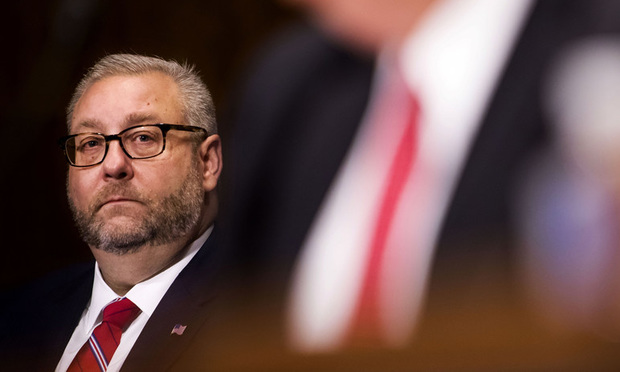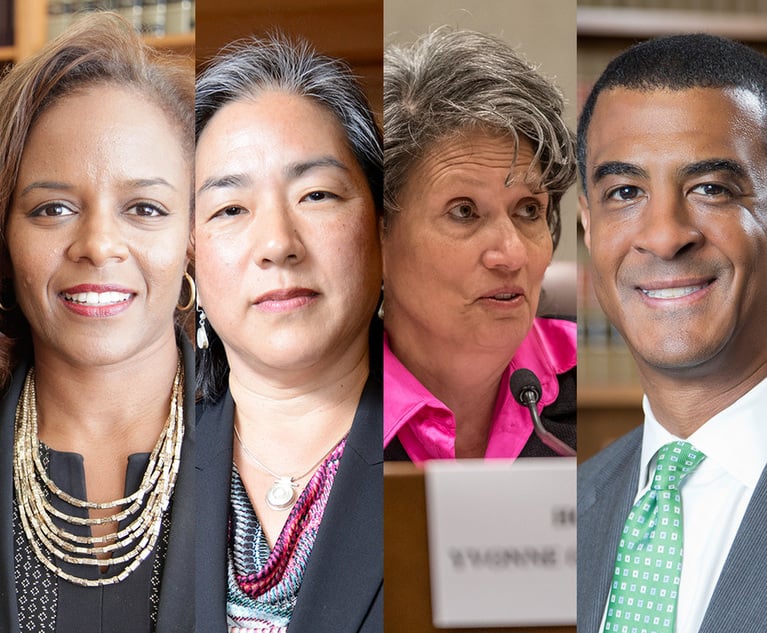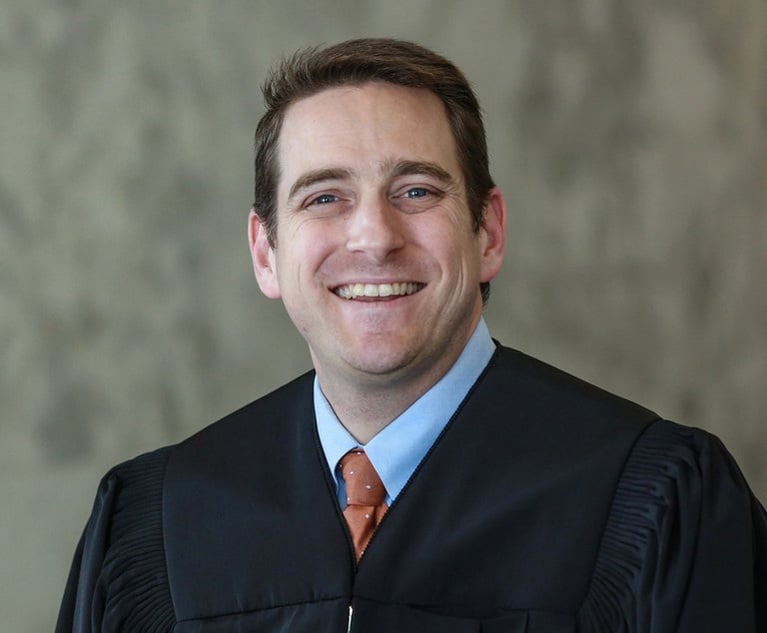Simpson Thacher Team Resolves Ericsson's FCPA Claims for $1B
"Ericsson's corrupt conduct involved high-level executives and spanned 17 years and at least five countries, all in a misguided effort to increase profits," Brian Benczkowski, head of DOJ's criminal division, said in a statement.
December 06, 2019 at 05:36 PM
5 minute read
The original version of this story was published on National Law Journal
 Brian Benczkowski testifies before the Senate Judiciary Committee during his confirmation hearing to be assistant attorney general in the Criminal Division. Credit: Diego M. Radzinschi/ NLJ
Brian Benczkowski testifies before the Senate Judiciary Committee during his confirmation hearing to be assistant attorney general in the Criminal Division. Credit: Diego M. Radzinschi/ NLJ
Updated at 7:10 p.m.
Ericsson AB on Friday agreed to pay more than $1 billion to resolve claims that the Swedish telecommunications company paid bribes between 2000 and 2017 to build business in Asia, Africa and the Middle East, capping a long-running investigation with one of the largest penalties ever assessed in the U.S. government's enforcement of anti-corruption law.
The settlement came three months after the Stockholm-based Ericsson, represented by Simpson Thacher & Bartlett partner Cheryl Scarboro, said it had set aside $1.2 billion to cover anticipated U.S. penalties. Under the terms of the settlement, Ericsson agreed to pay a $520 million criminal penalty to the Justice Department and give up about $540 million in alleged ill-gotten gains to the Securities and Exchange Commission.
Ericsson is also required to retain an independent compliance monitor for three years.
Brian Benczkowski, the head of the Justice Department's criminal division, had hinted earlier this week that the settlement was imminent. Without naming Ericsson, Benczkowski said at a conference in the Washington area that an upcoming corporate settlement would vault the Justice Department into a record year for recovering money under the Foreign Corrupt Practices Act, a federal law prohibiting overseas bribery.
In a prepared statement, Benczkowski credited the Internal Revenue Service, the SEC and federal prosecutors in Manhattan with their assistance in the investigation.
"Ericsson's corrupt conduct involved high-level executives and spanned 17 years and at least five countries, all in a misguided effort to increase profits," Benczkowski said Friday. "Such wrongdoing called for a strong response from law enforcement, and through a tenacious effort with our partners in the Southern District of New York, the SEC, and the IRS, today's action not only holds Ericsson accountable for these schemes, but should deter other companies from engaging in similar criminal conduct.
The Justice Department and SEC alleged that Ericsson used intermediaries to bribe officials in six countries, including Saudi Arabia and China, winning business valued at about $427 million as it scored lucrative contracts with state-owned telecommunications firms. Ericsson was also accused of having intermediaries pay for entertainment and lavish travel for government officials and their families.
Scarboro, a Washington-based Simpson Thacher partner and formerly the first chief of the SEC's FCPA unit, did not immediately comment.
Ericsson's CEO and president Börje Ekholm said in a statement: "I am upset by these past failings. Reaching a resolution with the US authorities allows us to close this legacy chapter. We can now move forward and build a stronger company."
The company pointed to number of steps taken to improve the ethics and compliance program. Those steps include refreshing compliance training; "introducing more sophisticated analytic tools to better identify and prevent high-risk transactions and engagements"; and enhanced ethics and compliance vetting for senior leaders.
The settlement marked the seventh criminal resolution the Justice Department reached with a corporation this year. It came on the heels of a shipbuilding subsidiary of the South Korea-based Samsung Group agreeing to pay $75 million to resolve corruption allegations stemming from a scheme to pay millions of dollars in bribes to Brazilian government officials. In another noteworthy settlement, Walmart Inc. paid $137 million to resolve an investigation into alleged bribery of government officials in Mexico, India, Brazil and China.
The Justice Department this year also issued declination letters to two companies under its policy for crediting companies that voluntarily disclose misconduct and cooperate with the government. In both cases, the Justice Department highlighted the companies' prompt reporting of misconduct and efforts to improve their compliance programs.
The Justice Department said Ericsson did not disclose the misconduct, which involved high-level executives. Ericsson was, however, credited for launching an internal probe, turning over extensive records and making regular presentations to the Justice Department, among other steps to cooperate with the government's investigation.
The more than $520 million criminal penalty reflected a 15% reduction from the bottom of the fine range set by federal sentencing guidelines, in what the Justice Department said was a nod to Ericsson's efforts to improve its compliance program.
Read more:
Harmon Rejoins King & Spalding as FBI Revolving Door Keeps Swinging
Vinson & Elkins Lands Former DOJ Prosecutor With FCPA Experience
Navigating the Modern Corporate Investigation
White-Collar Slowdown Forces Law Firms, Ex-Prosecutors to Adapt
Paul Hastings Lands Anti-Corruption Pair From Steptoe in DC
This post was updated with comment from Ericsson.
This content has been archived. It is available through our partners, LexisNexis® and Bloomberg Law.
To view this content, please continue to their sites.
Not a Lexis Subscriber?
Subscribe Now
Not a Bloomberg Law Subscriber?
Subscribe Now
NOT FOR REPRINT
© 2025 ALM Global, LLC, All Rights Reserved. Request academic re-use from www.copyright.com. All other uses, submit a request to [email protected]. For more information visit Asset & Logo Licensing.
You Might Like
View All
‘Listen, Listen, Listen’: Some Practice Tips From Judges in the Oakland Federal Courthouse

How the Court of Public Opinion Should Factor Into Litigation Strategy

An Eye on ‘De-Risking’: Chewing on Hot Topics in Litigation Funding With Jeffery Lula of GLS Capital
Law Firms Mentioned
Trending Stories
- 1New York State Authorizes Stand-Alone Business Interruption Insurance Policies
- 2Buyer Beware: Continuity of Coverage in Legal Malpractice Insurance
- 3‘Listen, Listen, Listen’: Some Practice Tips From Judges in the Oakland Federal Courthouse
- 4BCLP Joins Saudi Legal Market with Plans to Open Two Offices
- 5White & Case Crosses $4M in PEP, $3B in Revenue in 'Breakthrough Year'
Who Got The Work
J. Brugh Lower of Gibbons has entered an appearance for industrial equipment supplier Devco Corporation in a pending trademark infringement lawsuit. The suit, accusing the defendant of selling knock-off Graco products, was filed Dec. 18 in New Jersey District Court by Rivkin Radler on behalf of Graco Inc. and Graco Minnesota. The case, assigned to U.S. District Judge Zahid N. Quraishi, is 3:24-cv-11294, Graco Inc. et al v. Devco Corporation.
Who Got The Work
Rebecca Maller-Stein and Kent A. Yalowitz of Arnold & Porter Kaye Scholer have entered their appearances for Hanaco Venture Capital and its executives, Lior Prosor and David Frankel, in a pending securities lawsuit. The action, filed on Dec. 24 in New York Southern District Court by Zell, Aron & Co. on behalf of Goldeneye Advisors, accuses the defendants of negligently and fraudulently managing the plaintiff's $1 million investment. The case, assigned to U.S. District Judge Vernon S. Broderick, is 1:24-cv-09918, Goldeneye Advisors, LLC v. Hanaco Venture Capital, Ltd. et al.
Who Got The Work
Attorneys from A&O Shearman has stepped in as defense counsel for Toronto-Dominion Bank and other defendants in a pending securities class action. The suit, filed Dec. 11 in New York Southern District Court by Bleichmar Fonti & Auld, accuses the defendants of concealing the bank's 'pervasive' deficiencies in regards to its compliance with the Bank Secrecy Act and the quality of its anti-money laundering controls. The case, assigned to U.S. District Judge Arun Subramanian, is 1:24-cv-09445, Gonzalez v. The Toronto-Dominion Bank et al.
Who Got The Work
Crown Castle International, a Pennsylvania company providing shared communications infrastructure, has turned to Luke D. Wolf of Gordon Rees Scully Mansukhani to fend off a pending breach-of-contract lawsuit. The court action, filed Nov. 25 in Michigan Eastern District Court by Hooper Hathaway PC on behalf of The Town Residences LLC, accuses Crown Castle of failing to transfer approximately $30,000 in utility payments from T-Mobile in breach of a roof-top lease and assignment agreement. The case, assigned to U.S. District Judge Susan K. Declercq, is 2:24-cv-13131, The Town Residences LLC v. T-Mobile US, Inc. et al.
Who Got The Work
Wilfred P. Coronato and Daniel M. Schwartz of McCarter & English have stepped in as defense counsel to Electrolux Home Products Inc. in a pending product liability lawsuit. The court action, filed Nov. 26 in New York Eastern District Court by Poulos Lopiccolo PC and Nagel Rice LLP on behalf of David Stern, alleges that the defendant's refrigerators’ drawers and shelving repeatedly break and fall apart within months after purchase. The case, assigned to U.S. District Judge Joan M. Azrack, is 2:24-cv-08204, Stern v. Electrolux Home Products, Inc.
Featured Firms
Law Offices of Gary Martin Hays & Associates, P.C.
(470) 294-1674
Law Offices of Mark E. Salomone
(857) 444-6468
Smith & Hassler
(713) 739-1250







